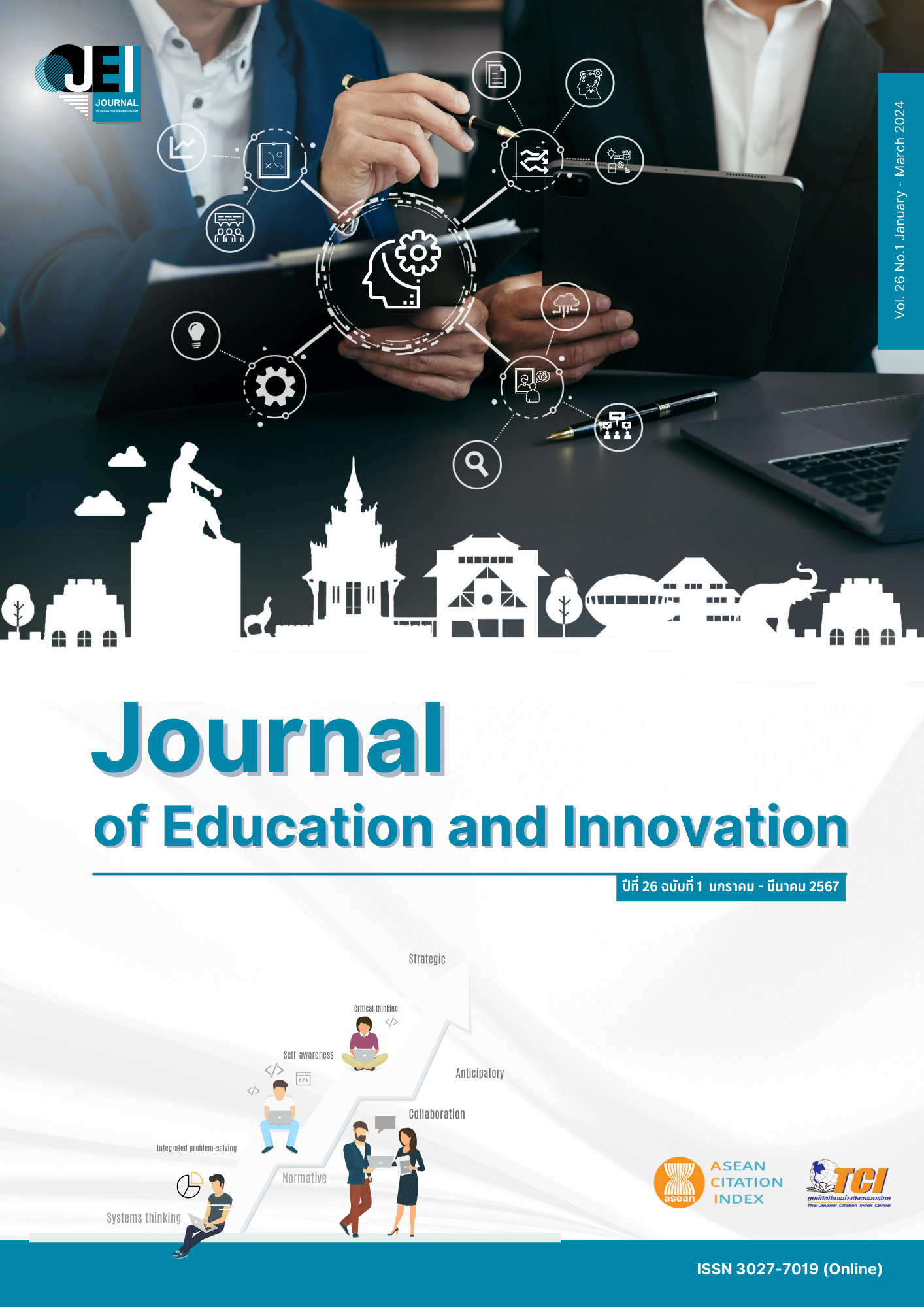A NEEDS ASSESSMENT OF DEVELOPING ACADEMIC MANAGEMENT TOWARDS ENHANCING ENTREPRENEURIAL MINDSET OF SECONDARY SCHOOL STUDENTS
Main Article Content
Abstract
This study was descriptive research, and its purposes were to study the current and desirable conditions of academic management and to analyze the priority needs of developing academic management towards enhancing the entrepreneurial mindset of secondary school students. The population were secondary schools under the Office of the Basic Education Commission, totally of 2,360 schools. The sample were 400 secondary schools, selected by applying stratified random sampling, and simple random sampling. The key respondents were 1,031 people including administrators, heads of curriculum development, and teachers. The research instrument was a questionnaire. The data were analyzed by frequency, percentage, means, standard deviation, and PNImodified. The research result were as follows 1) current condition of academic management towards enhancing the entrepreneurial mindset of secondary school students; overall at a high level ( = 3.95) and desirable condition of academic management towards enhancing the entrepreneurial mindset of secondary school students; overall at a high level (
= 4.45). 2) The priority needs of developing academic management towards enhancing the entrepreneurial mindset of secondary school students classified with regards to academic management; overall, the highest priority needs index fell on the development of teaching and learning (PNImodified = 0.134), the development of measurement and evaluation (PNImodified = 0.131), and the development of curriculum (PNImodified = 0.115), respectively. When classified with the entrepreneurial mindset; overall, the highest priority needs index fell on being encouraged to take risks (PNImodified = 0.146), being creative and innovative (PNImodified = 0.138), and being flexible and resilient (PNImodified = 0.135), respectively.
Article Details

This work is licensed under a Creative Commons Attribution-NonCommercial-NoDerivatives 4.0 International License.
The owner of the article does not copy or violate any of its copyright. If any copyright infringement occurs or prosecution, in any case, the Editorial Board is not involved in all the rights to the owner of the article to be performed.
References
Chamchoy, S. (2022). Academic Management Responsive to Change in Disruptive Era. Bangkok: Chulalongkorn University Press.
Dweck, C. S. (2006). Mindset: The New Psychology of Success. New York: Random House Publishing Group.
International Institute for Trade and Development. (2018). The entrepreneurship policy framework of the United Nations conference on trade and development. Bangkok: International Institute for Trade and Development.
Jiatong, W., Murad, M., Bajun, F., Tufail, M. S., Mirza, F., & Rafiq, M. (2021). Impact of entrepreneurial education, mindset, and creativity on entrepreneurial intention: Mediating role of entrepreneurial self-efficacy. Frontiers in Psychology, 12, 724440.
Juliana, N. O., Hui, H. J., Clement, M., Solomon, E. N., & Elvis, O. K. (2021). The impact of creativity and innovation on entrepreneurship development: Evidence from Nigeria. Open Journal of Business and Management, 1743-1770.
Lackeus, M. (2015). Entrepreneurship in education what, why, when, how. OECD.
Ministry of Education. (2008). Basic Education Core Curriculum, 2008. Bangkok: Ministry of Education.
Office of the Education Council. (2018). Entrepreneurship Education. Bangkok: Office of the Education Council.
Office of the Education Council. (2022). A study report on the learning ecosystem model contributing to the development of the potential of Thai people 4.0. Bangkok: Office of the Education Council.
Office of the National Economic and Social Development Council. (2018). The National Strategy (2018-2037). Bangkok: Office of the National Economic and Social Development Board.
Puapradit, T. (2022). Influence of entrepreneurial alertness and self-efficacy on entrepreneurial intention. Journal of Business Administration the Association of Private Higher Education Institutions of Thailand, 10(1), 214-229.
Saedan, S. (2021). Current and desirable conditions and needs for academic management development in primary schools under Bangkok Metropolitan Administration based on the concept of entrepreneurship characteristic. Educational Management and Innovation Journal, 4(2), 51-71.
Sopakool, A. (2021). Activities curriculum development to enhance creative innovation abilities integrated local wisdom of secondary students’ Nongbualumphu Province. Journal of Education Naresuan University, 25(2), 317-325.
UNCTAD. (2012). Entrepreneurship Policy Framework and Implementation Guidance. New York: United Nation.


